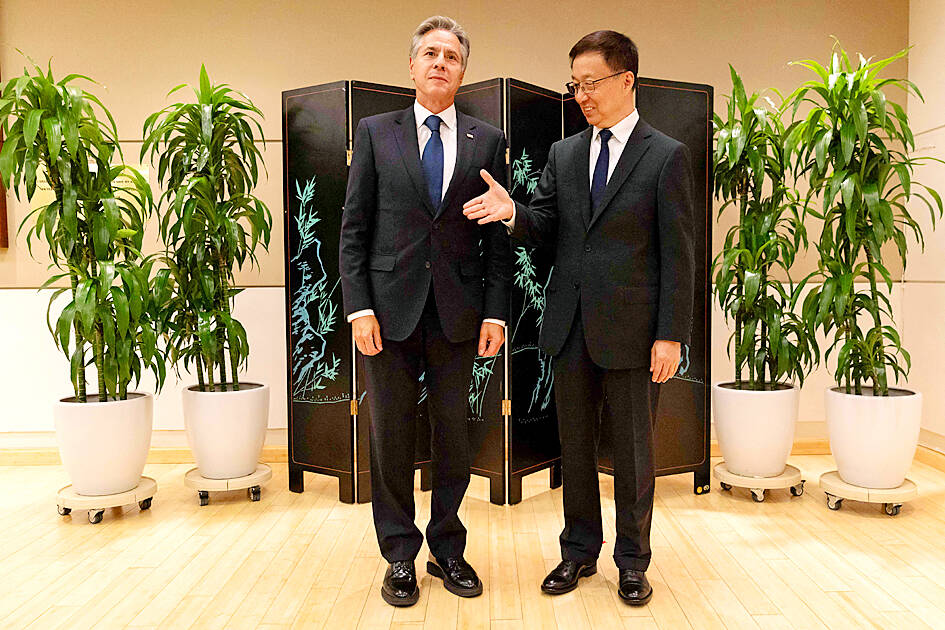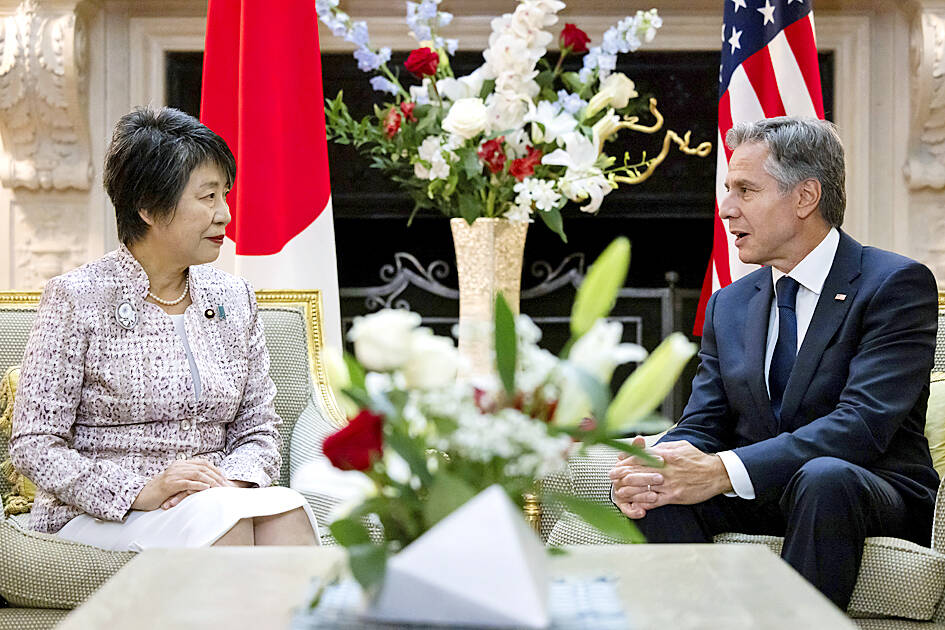Washington’s top diplomat on Monday stressed the importance of stability in the Taiwan Strait in a meeting with China’s vice president as the rival powers held their second high-level talks in days.
US Secretary of State Antony Blinken, meeting Chinese Vice President Han Zheng (韓正) in New York on the sidelines of the UN General Assembly, said he believed in “face-to-face diplomacy” to deal with disagreements.
“I think it’s a good thing that we have this opportunity to build on the recent high-level engagements that our countries have had,” Blinken told Han as they opened their meeting at China’s mission to the UN.

Photo: AFP
The talks aim to “make sure that we’re maintaining open communications and demonstrate that we are responsibly managing the relationship between our two countries,” he said.
Han said that the world’s two largest economies face “a lot of difficulties and challenges.”
“The world needs healthy and stable US-China relations, which benefit not only China and the US, but the whole world,” Han said.

Photo: AP
The meeting comes as the US watches personnel changes in Beijing with growing intrigue.
Former minister of foreign affairs Qin Gang (秦剛), handpicked by Chinese President Xi Jinping (習近平), was abruptly replaced in July by veteran policymaker Wang Yi (王毅).
US officials initially expected Wang to travel to the annual UN meeting, where he might have met briefly with US President Joe Biden, but instead China sent Han, better known for his tenure as mayor of Shanghai than for diplomacy.
Wang, who also is the Chinese Communist Party foreign policy director, held talks with Biden’s National Security Adviser Jake Sullivan in Malta at the weekend.
The US and China remain at loggerheads on a host of issues, including Taiwan.
China charges that the US is stirring up Taiwanese independence supporters, and has repeatedly staged shows of force.
The US says it is seeking the preservation of the “status quo” and has stepped up support, including last month for the first time approving direct military aid to Taiwan, which traditionally buys its own weapons.
Blinken in the talks with Han “underscored the importance of maintaining peace and stability across the Taiwan Strait,” US Department of State spokesman Matthew Miller said.
Touching on nations with close ties with China, Blinken also discussed “provocative actions” by North Korea and Russia’s invasion of Ukraine, Miller said.
China has also been outraged by US restrictions on high-end investment and exports of semiconductors from the US, which says it is doing that to safeguard its own security, but the tone has become comparatively civil.
Blinken and US Secretary of the Treasury Janet Yellen traveled this year to Beijing, resuming contact that had all but ceased during the COVID-19 pandemic.
Meanwhile, Blinken on Monday also met with Japanese Minister of Foreign Affairs Yoko Kamikawa and agreed on the necessity of stability in the Taiwan Strait.
“The Secretary and Foreign Minister also reaffirmed the importance of maintaining peace and stability in the Taiwan Strait, as well as upholding international law in the East and South China seas,” a statement issued by the State Department said following their talks.
“They also agreed to continue cooperation with other global partners to promote security and prosperity for our two nations, the Indo-Pacific region, and the world,” it said, adding that the two also agreed on “the importance of further bilateral cooperation, as well as trilateral cooperation with the Republic of Korea.”
Additional reporting by staff writer

CHAOS: Iranians took to the streets playing celebratory music after reports of Khamenei’s death on Saturday, while mourners also gathered in Tehran yesterday Iranian Supreme Leader Ayatollah Ali Khamenei was killed in a major attack on Iran launched by Israel and the US, throwing the future of the Islamic republic into doubt and raising the risk of regional instability. Iranian state television and the state-run IRNA news agency announced the 86-year-old’s death early yesterday. US President Donald Trump said it gave Iranians their “greatest chance” to “take back” their country. The announcements came after a joint US and Israeli aerial bombardment that targeted Iranian military and governmental sites. Trump said the “heavy and pinpoint bombing” would continue through the week or as long

TRUST: The KMT said it respected the US’ timing and considerations, and hoped it would continue to honor its commitments to helping Taiwan bolster its defenses and deterrence US President Donald Trump is delaying a multibillion-dollar arms sale to Taiwan to ensure his visit to Beijing is successful, a New York Times report said. The weapons sales package has stalled in the US Department of State, the report said, citing US officials it did not identify. The White House has told agencies not to push forward ahead of Trump’s meeting with Chinese President Xi Jinping (習近平), it said. The two last month held a phone call to discuss trade and geopolitical flashpoints ahead of the summit. Xi raised the Taiwan issue and urged the US to handle arms sales to

State-run CPC Corp, Taiwan (CPC, 台灣中油) yesterday said that it had confirmed on Saturday night with its liquefied natural gas (LNG) and crude oil suppliers that shipments are proceeding as scheduled and that domestic supplies remain unaffected. The CPC yesterday announced the gasoline and diesel prices will rise by NT$0.2 and NT$0.4 per liter, respectively, starting Monday, citing Middle East tensions and blizzards in the eastern United States. CPC also iterated it has been reducing the proportion of crude oil imports from the Middle East and diversifying its supply sources in the past few years in response to geopolitical risks, expanding

Pro-democracy media tycoon Jimmy Lai’s (黎智英) fraud conviction and prison sentence were yesterday overturned by a Hong Kong court, in a surprise legal decision that comes soon after Lai was jailed for 20 years on a separate national security charge. Judges Jeremy Poon (潘兆初), Anthea Pang (彭寶琴) and Derek Pang (彭偉昌) said in the judgement that they allowed the appeal from Lai, and another defendant in the case, to proceed, as a lower court judge had “erred.” “The Court of Appeal gave them leave to appeal against their conviction, allowed their appeals, quashed the convictions and set aside the sentences,” the judges